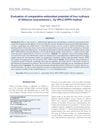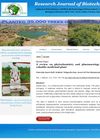 16 citations,
May 1998 in “International Journal of Dermatology”
16 citations,
May 1998 in “International Journal of Dermatology” Stress hormones like cortisol may trigger psoriasis flare-ups.

The research developed a human hair keratin and silver ion hydrogel that could help heal wounds.
 11 citations,
November 2013 in “Skin Pharmacology and Physiology”
11 citations,
November 2013 in “Skin Pharmacology and Physiology” Azelaic Acid is effective and safe for treating adult female acne, with few side effects.
[object Object]  47 citations,
March 2019 in “Journal of immunology research”
47 citations,
March 2019 in “Journal of immunology research” Valproic Acid could potentially be used to treat immune-related conditions due to its ability to modify immune cell functions.
 4 citations,
January 2022 in “Journal of clinical and translational research”
4 citations,
January 2022 in “Journal of clinical and translational research” Chitosan-based dressings reduce inflammation and speed up skin wound healing.
 December 2022 in “The Journal of Multidisciplinary Research”
December 2022 in “The Journal of Multidisciplinary Research” The polyherbal hair gel with guava leaves, amla, and aloe is effective for scalp health and treating fungal infections.
 1 citations,
May 2019 in “British journal of health care management/British journal of healthcare management”
1 citations,
May 2019 in “British journal of health care management/British journal of healthcare management” Choose cost-effective emollients for dry skin conditions and prescribe appropriate amounts.
May 2024 in “Pharmacia/Farmaciâ” Purple sweet potato leaf extracts can help treat hair loss and fungal infections.
[object Object]  January 2023 in “Applied sciences”
January 2023 in “Applied sciences” Gefitinib and Sasam-Kyeongokgo together significantly reduce cancer growth and improve immune response in mice.
 24 citations,
December 2009 in “Future Medicinal Chemistry”
24 citations,
December 2009 in “Future Medicinal Chemistry” Using computers to analyze drugs can find new uses for them, but actual experiments are needed to confirm these uses.

Nanoformulations improve luteolin's effectiveness as a cancer treatment.
 37 citations,
January 2015 in “Evidence-based Complementary and Alternative Medicine”
37 citations,
January 2015 in “Evidence-based Complementary and Alternative Medicine” An extract from Quercus acutissima bark was found to reduce sebum production and block an enzyme linked to acne.
 August 2023 in “International journal of experimental research and review”
August 2023 in “International journal of experimental research and review” Ficus racemosa leaf extracts help heal diabetic wounds and lower blood sugar.
9 citations,
July 2021 in “Frontiers in genetics” Melatonin makes cashmere grow earlier and more by increasing certain gene activity in goats.
 13 citations,
October 2012 in “Free Radicals and Antioxidants”
13 citations,
October 2012 in “Free Radicals and Antioxidants” The red Hibiscus rosa-sinensis flower has the highest antioxidant activity.
 10 citations,
May 2018 in “Nutrition and Cancer”
10 citations,
May 2018 in “Nutrition and Cancer” Certain spices may help prevent and treat skin cancer, but more human trials are needed.
 1 citations,
March 2011 in “Informa Healthcare eBooks”
1 citations,
March 2011 in “Informa Healthcare eBooks” Isotretinoin is a preferred treatment for severe acne, often leading to long-term improvement, but requires careful monitoring due to potential side effects.
 8 citations,
January 2013 in “Medicinal chemistry”
8 citations,
January 2013 in “Medicinal chemistry” The compound 4c showed strong potential as an anticancer agent.
4 citations,
October 2018 in “Journal of drug delivery and therapeutics” Hansraj is effective for various health issues but should not be used during pregnancy.
 February 2022 in “Research Journal of Biotechnology”
February 2022 in “Research Journal of Biotechnology” Eclipta alba L. is a medicinal plant with many health benefits, including treating diseases and promoting hair growth.
 45 citations,
August 2018 in “Stem Cells International”
45 citations,
August 2018 in “Stem Cells International” Stem cells, especially from fat tissue and Wharton's jelly, can potentially regenerate hair follicles and treat hair loss, but more research is needed to perfect the treatment.
 2 citations,
October 2022 in “International journal of Ayurvedic medicine”
2 citations,
October 2022 in “International journal of Ayurvedic medicine” Licorice has many traditional health benefits, but more research is needed to fully support these claims.
 June 2024 in “Korean Journal of Pharmacognosy”
June 2024 in “Korean Journal of Pharmacognosy” The compound from Rhododendron mucronulatum roots may help treat male pattern hair loss.
 26 citations,
May 2013 in “Marine Drugs”
26 citations,
May 2013 in “Marine Drugs” Ishige sinicola, a type of seaweed, may help hair grow by blocking a hair loss-related enzyme and boosting important cell growth.
 1 citations,
January 2015 in “Journal of nutrition & health”
1 citations,
January 2015 in “Journal of nutrition & health” Fish oil improves skin health in people with diabetes and high cholesterol.
 April 2019 in “Majalah Obat Tradisional”
April 2019 in “Majalah Obat Tradisional” Menthol boosts the hair growth effects of Phyllanthus niruri gel.
 106 citations,
April 2010 in “ACS Nano”
106 citations,
April 2010 in “ACS Nano” C60 fullerenes can alter protein function and may help develop new disease inhibitors.
 26 citations,
October 2011 in “International Journal of Biological Macromolecules”
26 citations,
October 2011 in “International Journal of Biological Macromolecules” Some newly made compounds are promising for treating enlarged prostate, hair loss, viruses, and prostate cancer, and might be better than current drugs.
 3 citations,
May 2021 in “Evidence-based Complementary and Alternative Medicine”
3 citations,
May 2021 in “Evidence-based Complementary and Alternative Medicine” Some traditional Chinese medicines may have anti-aging benefits and could help with hair growth, but more research is needed.
 4 citations,
May 2019 in “Zeitschrift für Naturforschung C”
4 citations,
May 2019 in “Zeitschrift für Naturforschung C” Ishige sinicola extract helps bone-building cells grow and mature, which could aid in treating osteoporosis.



























